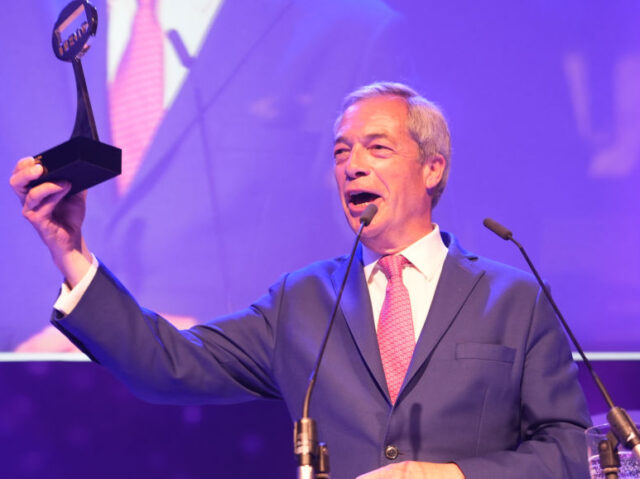“It’s happening”, Nigel Farage tells Breitbart as the battle for social media heats up and shows his Reform Party enjoying a commanding lead across platforms by practically any metric.
Reform UK party leader Nigel Farage hailed the work ethic and increasingly right-wing views of the youngest voters in the United Kingdom, noting in just three weeks of the General Election campaign since he took back control of the party he founded, support had increased.
He told Breitbart news: “It’s happening. Gen-Z is very different. Very different to Millennials. I see a lot more ambition, I see a lot more rejection of what they’re being indoctrinated with at school and university… I think the most remarkable part of our campaign in the weeks since I came back to do this, we’ve gone from three per cent in the 18-24 vote to between 15-21 [per cent] depending on which pollster you look at. Either way it’s a very rapid advance”.
While Mr Farage had also said the time for Thatcherism as an answer to the country’s problems had long passed, nevertheless he saw a lot of the 1980s spirit in young people, who are much more focussed on getting ahead than their laid-back Millennial counterparts. He continued: “I see a lot of 1980s thinking in a growing number of young people. They’re quite ambitious, they want to get houses, they want to get well-paid jobs. They turn up at events I do, they’re all quite well turned out. It’s quite interesting, whereas the Millennials talk about work-life balance and things like that. There’s a big generational shift.”
Reform insiders have made clear at least some of this progress with the youngest voters is down to the party making serious advances on social media, and much of this growth appears to be organic. British broadcaster Sky News this week compared the performance of the parties contesting this General Election and found while Labour was throwing money at social media, outspending all other parties combined, it was Farage’s Reform actually getting the highest number of page interactions by a considerable margin.
The report stated that while Labour spent £1.7 million ($2.1 million) on social adverts and got little-more than half a million social media page interactions, Reform UK had spent a tiny fraction of that, just £26,000 ($32,000) but got over one and a half million interactions on Facebook.
Other tealeaf-reading from social media interaction saw the broadcaster assert 16 of the top 20 most ‘loved’ Facebook statuses posted by party leaders this campaign have been by Mr Farage. A professor of digital politics consulted for the article told Sky: “Despite being one of the smallest and least formally organised parties, Reform has dominated on Facebook in terms of organic interactions… This could be put down to the parties having different numbers of followers, but Reform UK and Labour have nearly identical numbers of page followers, suggesting that Reform is having greater success in getting a response.”
Separately, British left-wing newspaper The Guardian looked at the comparative performance of British political parties on Chinese-owned TikTok and divined a similar picture. While Britain’s Parliament has banned TikTok from its network over security concerns, it has nevertheless been seen as a tool to access the otherwise hard-to-reach Gen-Z audience and it is an emerging battleground for political engagement in this election.
Here, Nigel Farage dominates as well. The paper states he outperforms all other parties and candidates for the election, noting while Labour posts more often and can claim to have more watches overall, Reform’s operation posts “the highest-performing content and easily beats Labour on a per-video basis by 30%”. The average Farage post on TikTok outperforms the average Conservative post by double, it was reported.
While Farage’s British populism isn’t directly comparable to the populist parties now surging across Europe his success in courting Gen-Z votes is reflected elsewhere. In Germany, for instance, the Green party — long the default political position for young people, particularly when the Millennials were the youngest cohort of voters — haemorrhaged support. Polling earlier this year showed the hard-left Greens losing 23 points and dropping to fourth-place among 16-to-24-year olds.
Turning the old paradigm on its head, the top two parties supported by young voters in Germany are both right wing, the establishment conservatives and the populist-right. In America, Gen-Z are increasingly turning up for Donald Trump, with analysis by UnHerd suggesting the generation’s cultivated sense of irony immunising them from the pious outrage of older generations at Trump’s combative, unconventional style.
As previously reported by Breitbart News, Trump is now at level-pegging with Biden among Gen-Z, an enormous shift in attitudes from just a couple of elections ago, when the youngest voters — again, then the tail end of the Millennial-era who are now in their late-20s and early 30s — skewed massively left.




